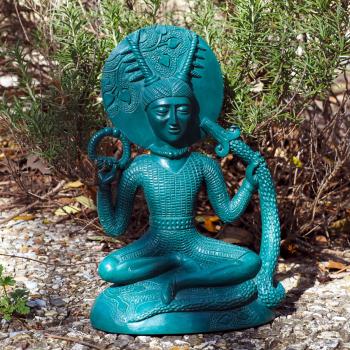Every so often I see conservatives – both religious and political – loudly exclaim “our rights come from God, not from government!” And by “God” they mean the Christian God. They may attempt to include Jews in their appeal to divinity (while ignoring Jewish tradition and thinking) but never Muslims, much less polytheists or pantheists.
This is a rather odd position, considering that neither the Bible nor Christian tradition put much emphasis on individual rights as we understand them – something that becomes quite clear if you listen to Protestant Dominionists or Catholic Integralists for very long. Both of these movements advocate for theocracies that would outlaw “sin” as they understand it and eliminate freedom as we understand it.
The idea of civil rights began with the ancient Greeks. But for Aristotle and Plato, rights were not about individual autonomy so much as they were about creating an orderly and virtuous society. The English word “idiot” has roots in the Greek ἰδιώτης meaning someone who is so unintelligent and uneducated they put their personal interests above the common good. Rights were seen as a means to a collective end.
Our current ideas about fundamental human and civil rights are a product of the Enlightenment. Plato was correct that a virtuous society requires order, but an emphasis on order often leads to oppression – particularly when the order includes rigid hierarchies. And having the Church as the final authority on what is and isn’t virtuous leads to arbitrary rules based on religious beliefs and doctrines that are clearly unprovable.
Enlightenment thinking is in large part a reaction to the murderous abuses of the witch hunts and the Inquisition. People recognized the abuses and wanted to keep them from happening again.
A false dichotomy
“If our rights don’t come from God then they come from government, and government can take them away anytime it likes.”
This is a false dichotomy that ignores the history of the evolution of human rights. It’s also a backdoor attempt to affirm Christian theology: if we have inherent rights (and we want to say we do) and they don’t come from government (liberal or conservative, we don’t trust the government) then they must come from the Christian God, and so the Christian God must exist.
In contemporary politics, whether something is true is less important than whether it gets people to vote for your candidate.
If you want to know the truth of where our rights come from, study history and philosophy.
Still, we often talk of human rights in terms that belie their rather messy and humanistic origin. We call them “inherent” and “inalienable” – something everyone must acknowledge and that no one can take away… even though they often do. More relevantly to this post, when people scream “our rights come from my God!” responding with a reading list – or even with the Wikipedia page on the Declaration of the Rights of Man and of the Citizen – is not likely to be effective or helpful.
So I would like to take a look at the origins of human rights from a modern Pagan perspective.
What are rights, anyway?
Rights are those things to which we are entitled simply because we are human. They assume that the conditions of dignity, freedom, and autonomy are essential for human thriving and that no one may infringe upon them, except in rare cases and with due process (such as with imprisoning violent criminals).
Rights are easier understood by listing them than by defining them. Perhaps the best such list is the Universal Declaration of Human Rights, adopted by the United Nations in 1948 in the aftermath of World War II and the Holocaust. They include the rights to life, liberty, and security; to due process and equality before the law; and to freedom of thought, conscience, and religion, including the right to change your religion.
Critics of the Universal Declaration of Human Rights point to the fact that some of its signatories are blatant violators of human rights. Others criticize its humanist roots. And a few think some of the rights – especially Article 25’s right to a standard of living adequate for health and well-being – are not rights.
I think that as society’s understanding and resources go up, what members of that society have a right to expect from it go up proportionally. What was not a right in ancient times was clearly a right in 1789, and what was not a right in 1789 is clearly a right in 2024. But that’s another argument for another time. For now, it’s enough to say that rights are those things to which we are entitled simply because we exist.
“Endowed by their Creator” has been a mostly good thing
Those who claim that rights come from the Christian God like to point to the Declaration of Independence: “We hold these truths to be self-evident, that all men are created equal, that they are endowed by their Creator with certain unalienable Rights, that among these are Life, Liberty and the pursuit of Happiness.”
Thomas Jefferson – creator of the Jefferson Bible, with all the supernatural elements removed – was not making a theological statement when he wrote those words. He was making a political appeal to a higher authority, one he knew would be recognized on both sides of the Atlantic. He was driving one of the final nails in the coffin of the Divine Right of Kings – an idea that is supported by the Bible and Christian tradition.
The results have been mostly favorable for the spread of human and civil rights. In a society that was overwhelmingly Christian, grounding rights in the Christian God gave them authority that they would not have had otherwise.
But what the vast majority of people agreed on in 1776 was no longer so clear by the 20th century. How can you say rights come from the Christian God in a society where a significant (and fast-growing) number of people don’t believe in the existence of the Christian God?
It might still work if the “rights come from God” folks were content to ground them in the kind of ceremonial deism spoken of by former Supreme Court Justice Sandra Day O’Connor and others in the courts. But they aren’t, and it’s a short walk from “our rights come from God” to “our rights come from my God” to “my God doesn’t approve of that, so it isn’t a right.”
And so we need a more universal grounding for human rights.
Rights as natural adaptations
Look at the stars and planets, the forests and mountains, the trees and birds and rabbits. Where do you find rights?
You don’t.
You find “nature red in tooth and claw.” You find plants and animals trying to survive and reproduce, passing down useful mutations and adaptations, concerned only with themselves and their own groupings.
Until you look a little deeper.
And until you remember that humans are part of Nature.
Humans are not solitary animals. We live in families, tribes, communities, nations. The ancient Greek idea of rights – limited though it was – came out of the desire to build a better society. A society that respects the dignity, freedom, and autonomy of every person will be healthier, more resourceful, and more resilient than societies that don’t. Not in every case (hierarchy and authoritarianism have short term advantages, especially in times of conflict) but often enough that over long periods of time, societies that respect and promote human rights will outperform those who don’t (see the Cold War for a recent example).
Human rights are an adaptation of human social evolution.
Our rights come from Nature. Not through any grant or divine decree, but through the processes of learning and growth. And as with so much else that comes from Nature, it’s taking us a very long time to discover these rights and to figure out how to make use of them.
Rights are embodied virtues
Virtues are those qualities that over time have been shown to be helpful – things like reciprocity, hospitality, honesty, moderation, courage, justice, and kindness. Virtues do not exist in a vacuum. Rather, they are emergent: they flow from the interactions of persons, human and otherwise.
There can be no hospitality in a lifeless world. There are no guests, there are no hosts, and there are no obligations from that interaction. But once we have life we begin to have interactions, which lead to the principles and practice of hospitality that help life to grow and thrive.
That’s as close to a definition of “good” as I can get: that which promotes the growth and thriving of all persons.
Rights are virtues put into practice in a society.
The Gods do not grant us rights – the Gods point us toward rights
One of the definitions of a God (or perhaps, one of the primary characteristics of a God) is the personfication of virtues. The Morrigan is (among other things – Gods are whole persons) the personfication of sovereignty. Brighid is the personification of poetry, smithcraft, and healing.
Through Their stories and through Their interactions with us, the Gods provide demonstrations and illustrations of virtues (and occasionally, illustrations of what is not virtuous). When we act in a virtuous manner, we become more God-like ourselves.
When we respect the rights of others and promote rights for all, we are promoting virtue and virtuous behavior – we are doing the work of the Gods.
Our rights are not granted by the Christian God or any other God. But the Gods point us toward rights.
It is up to us to recognize them, to encode them into our laws, and to insure that everyone can enjoy them.
Rights are always aspirational and never fully guaranteed
Because we are discovering and creating our rights through a natural process, they are always aspirational. They are never complete, never perfected.
Aristotle believed that some people were “natural slaves.” The same Thomas Jefferson who so eloquently said it is self-evident that all men are created equal also owned slaves. A civil war ended slavery in this country and a civil rights movement made progress toward true equality, but there are still some who believe some races are inherently better and others inherently inferior.
We have made progress.
We still have far to go.
And too many among us want to turn back.
Rights denied must be recognized
Because rights emerge from Nature, and because they are always aspirational, they must be recognized. And that takes time and effort.
Perhaps Aristotle – brilliant as he was – can be forgiven for thinking that some people are best suited for slavery. Jefferson knew better but could not – or would not – challenge the status quo. Today’s racists, bigots, and white nationalists have no excuses.
But when we recognize that rights exist, or that rights we have already acknowledged are not being fully respected, it is our obligation to extend them and enforce them immediately.
It’s ironic that those who claim “rights come from God” are among the loudest in insisting that rights cannot be extended to previously excluded persons unless they’re approved by legislatures. If they truly believed rights come from their God, their response to those demanding equal rights should be “oh, we’re sorry we’ve overlooked you for all this time – we’ll fix that now.”
Which is to say that originalism belongs on the trash heap of legal history.
Our rights come from Nature but are made real by our actions
Our fundamental rights come neither from any God nor from government but from Nature. They emerge through the adaptations of human social evolution, making our societies healthier, more resourceful, more resilient, and more virtuous. Our job is to recognize them, to encode them into our laws, and to insure that everyone can enjoy them.
And these days, it’s also our job to protect them from those who wish to take our country and our world backwards to a time when only a few were free and many were not.





















